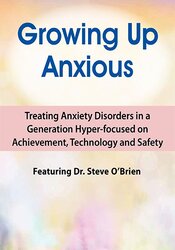
×

We all want kids to be successful, safe, and secure, but such good intentions are having unintended consequences.
Three societal ingredients … a hyper-academic mindset, preoccupation with safety, and a tech-obsessed society … are fueling childhood anxiety, leaving kids fearful, avoidant, and ill-equipped for adulthood.
Join child psychologist Steve O’Brien, Psy.D., for 2 days filled with practical strategies as he presents a three-level treatment model for childhood anxiety using targeted, evidence-based therapies to:
Don’t miss out on this cutting-edge program for equipping and empowering kids to not only cope with anxiety, but to thrive as they develop a growing sense of both competence and confidence!
Best of all, upon completion of this live training, you’ll be eligible for Certification in Child and Adolescent Anxiety through Evergreen Certifications. Certification lets colleagues, employers, and clients know that you’ve invested the extra time and effort necessary to understand the complexities of child and adolescent anxiety counseling. Professional standards apply.
Certifications customized to match your professional background include:
NOTE: Each purchase includes CE credit for one individual (participants in full attendance will be able to print the certificate of completion after passing the online post-test (80% passing score) and completing the evaluation). Instructional methods will include PowerPoint, didactic lecture, Q&A, and others.
Continuing Education Information: Credits listed below are for full attendance at the live, interactive webinar only. This webinar is being broadcast live in real-time and must be attended live, in its entirety, in order to earn credit. You will be able to type questions to the speaker. The speaker will see the questions and address them during the presentation as time allows. Please note, your licensing board dictates whether web-based activities are an acceptable form of continuing education, as well as which credit types are acceptable for continuing education hours. Please refer to your licensing board's rules and regulations. If your profession is not listed, please contact your licensing board to determine your continuing education requirements and check for reciprocal approval. For other credit inquiries not specified below, please contact info@pesi.com or 800-844-8260 before the event.
Materials that are included in this course may include interventions and modalities that are beyond the authorized practice of your profession. As a licensed professional, you are responsible for reviewing the scope of practice, including activities that are defined in law as beyond the boundaries of practice in accordance with and in compliance with your profession's standards.
For Planning Committee disclosures, please see the statement above. For speaker disclosures, please see the faculty biography.
Earn up to 12.5 CE hours. Please see below, for more details, as credit amounts vary by jurisdiction and profession.
PESI, Inc. is approved by the Canadian Counselling and Psychotherapy Association to offer continuing education for counsellors and psychotherapists. PESI, Inc. maintains responsibility for the program. This activity is approved for 12.5 credit hours.

PESI, Inc., #1062, is approved as an ACE provider to offer social work continuing education by the Association of Social Work Boards (ASWB) Approved Continuing Education (ACE) program. Regulatory boards are the final authority on courses accepted for continuing education credit. ACE provider approval period: January 27, 2023 - January 27, 2026. Social workers completing this course receive 12.75 Clinical continuing education credits.
Course Level: Intermediate Format: Synchronous Distance. Full attendance is required; no partial credits will be offered for partial attendance.
Canadian Social Workers: Canadian provinces may accept activities approved by the ASWB for ongoing professional development.
This activity qualifies for 760 continuing education minutes as required by many national and local licensing boards and professional organizations. Save your activity advertisement and certificate of completion, and contact your own board or organization for specific requirements.

Steve O’Brien, PsyD, is a clinical psychologist with nearly 30 years of experience treating children, adolescents, families and young adults in his Clearwater, Florida practice. His specialty areas include child-adolescent anxiety/depression, ADHD, Autism Spectrum Disorders, and divorced/blended family adjustment. Dr. O’Brien utilizes an integrative-systems model, which tailors treatment to the developmental needs of youth and families. Intensive parent consultation and youth-focused family interventions are critical components of his therapeutic approach.
Dr. O’Brien has worked in numerous healthcare environments, including community mental health, psychiatric, inpatient/residential, substance abuse, and medical facilities. He also served as associate professor of child-adolescent studies at the Florida School of Professional Psychology. In addition to his clinical work, Dr. O’Brien is an app developer (Life@Home by Psychtouch.com) and a media consultant for both Tampa Bay and national news outlets. Visit obrienpsychology.com for more information.
Speaker Disclosures:
Financial: Dr. Steven O'Brien maintains a private practice. He receives a speaking honorarium, recording and book royalties from Psychotherapy Networker and PESI, Inc. He has no relevant financial relationships with ineligible organizations.
Non-financial: Dr. Steven O’Brien is a member of the American Psychological Association and the Florida Psychological Association.
For live CE credit, you must watch the live webcast in its entirety at its scheduled time and complete the CE quiz and evaluation within one week. You will have access for 90 days after the program for review.
Please note: There will be a 70-minute lunch and two 15-minute breaks; one in the morning and one in the afternoon. Lunch and break times will be announced by the speaker and at their discretion. A more detailed schedule is available upon request.
Visit our FAQ page at https://www.pesicanada.ca/faq or contact us at https://www.pesicanada.ca/contact-us.
BIOPSYCHOSOCIAL TREATMENT: THE SECOND INTERVENTION
TARGETED TREATMENT FOR MAJOR (DSM-5™) ANXIETY DISORDERS: THE THIRD INTERVENTION
CO-OCCURRING DISORDERS: TREATMENT IMPLICATIONS, RISKS, AND LIMITATIONS
ANXIETY-RIDDEN AT SCHOOL: CONSIDERATIONS AND CLASSROOM APPLICATIONS
MEASURING TREATMENT PROGRESS
| 5 |
|
| 4 |
|
| 3 |
|
| 2 |
|
| 1 |
|
Satisfaction Guarantee
Your satisfaction is our goal and our guarantee. Concerns should be addressed to info@pesicanada.com.
Please wait ...